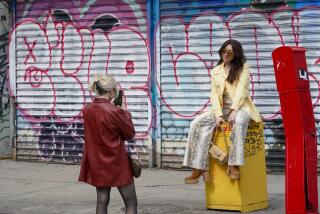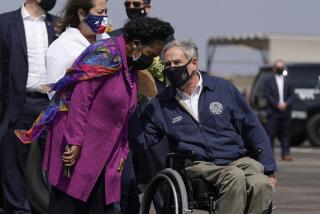New York to expand coronavirus testing for minority and low-income communities
- Share via
With black, Latino and low-income residents being infected at higher rates, New York Gov. Andrew Cuomo said Saturday he was launching a coronavirus testing initiative aimed at addressing the disparity.
Cuomo told reporters he plans to expand coronavirus testing at 24 churches in communities of color and low-income areas. Public officials, working with churches and religious leaders, will help organize and run the temporary facilities and encourage people in those communities to get tested, Cuomo said.
The governor said 20 of the 21 ZIP Codes in New York with the most COVID-19 hospitalizations have greater than average percentages of black or Latino residents.
“There is no doubt it is a problem,” Cuomo said. “We must address the racial disparities of this pandemic and meet the need where it is.”
“Hospitals report nightly how many cases they have and where they come from. When you look into that information, especially in Brooklyn and the Bronx, it’s clear the communities are from heavier low-income and minority populations.”
Cuomo said coronavirus testing is also being offered at public housing complexes and that officials have delivered face masks and hand sanitizer to public housing residents.
Rep. Hakeem Jeffries (D-N.Y.), who is helping coordinate the assistance effort, said people of color and low-income communities across the nation historically have been hit hard during emergencies because of a lack of resources.
“We can address this COVID-19 pandemic with these houses of worship and religious leaders who have the capacity to reach those in the community who need to be tested,” he said. “This is not over for any of us.”
In Georgia, where Gov. Brian Kemp lifted some coronavirus restrictions last week, a study by the Centers for Disease Control and Prevention found that black residents accounted for 83% of COVID-19 hospitalizations, despite making up 32% of the state’s population.
Georgia residents are allowed to again dine in restaurants and go to movie theaters, gyms, churches and beauty salons as long as social distancing guidelines are observed, even though the number of confirmed cases in the state has reached 32,497, and the death toll has climbed to 1,400.
In Kansas, according to new information from the APM Research Lab, black residents have been seven times more likely than white residents to die from COVID-19. Kansas Gov. Laura Kelly began allowing some businesses, such as restaurants and religious centers, to reopen on Monday as long as they comply with social distancing guidelines.
Researchers at APM also found that black residents in Missouri, Wisconsin and Washington, D.C., have been six times more likely than white residents to die from COVID-19. In Arkansas, Illinois, Louisiana, Oregon and South Carolina, researchers said, black residents have been three times more likely to die.
Public health experts note that people of color may be at higher risk because they often live in more densely populated neighborhoods, a vestige of housing segregation and a problem for social distancing. Such areas also may have few large supermarkets, making it more difficult for families to stock up on groceries and stay at home for longer stretches of time.
Researchers are also pointing to the heightened economic impact of lockdowns.
A report released Friday by the Department of Labor that showed the jobless rate at 14.7% — the highest since the Great Depression — also revealed data showing the disaster disproportionately affecting Americans along racial lines.
Latinos had the the highest unemployment rate, at nearly 19%, compared with 14.2% for whites. The unemployment rate for black people was 16%; for Asians, it was 14%. In February, the unemployment rate stood at 4% among Latinos, 5.8% for blacks, 2.5% for Asians and 3.1% for whites.
On Saturday, the nation’s death toll from the pandemic stood at more than 78,700, according to Johns Hopkins University.
Hard-hit New York has witnessed a steady decline in daily reports of new cases and a dip in coronavirus-related hospitalizations in recent weeks. But Cuomo said a disturbing number of New Yorkers are still dying daily.
He said 226 New Yorkers died from COVID-19 in a 24-hour period ending Friday, bringing the total in the state to more than 21,000.
“There are 226 people who lost their lives despite everything our healthcare system could do,” Cuomo said. “You see how that number is infuriatingly constant. It’s where we were five days ago.”
He also expressed alarm that the virus has taken the lives of three young children in New York and that 73 toddlers who had tested positive for COVID-19 in the state had been showing symptoms similar to toxic shock syndrome and Kawasaki disease.
Cuomo said the new information, which he called “truly disturbing,” is an indicator of just how little is definitively known about the virus.
“We were laboring under the impression that young people were not affected by COVID-19. And that was actually good news,” Cuomo said. “We are not so sure that is the fact anymore.”
Even as coronavirus cases across the nation continue to climb, more than 40 states, including California and Nevada, have taken steps to reopen businesses, albeit in a variety of ways.
On Saturday, Nevadans were able to venture out for the first time in nearly two months to some hair salons, barbershops and retail stores that have reopened, but under strict social distancing guidelines. Nevada Gov. Steve Sisolak had initially extended the state’s stay-at-home order through May 15 but on Thursday announced he would be lifting restrictions sooner because he said he saw a downward trajectory of hospitalizations and coronavirus cases in the state.
Public health experts and federal guidelines recommend there be a 14-day decrease in confirmed coronavirus cases, improved testing and a return to normal conditions in hospitals before states begin to loosen lockdown restrictions.
But governors in some states where cases have yet to decline have decided to reopen anyway.
In Florida, which recently marked its deadliest COVID-19 week, Gov. Ron DeSantis has announced that starting Monday, barbershops and salons will be allowed to reopen everywhere but Broward and Miami-Dade counties.
Texas Gov. Greg Abbott allowed salons to reopen on Friday. Retail stores, malls, movie theaters and restaurants had already been allowed to reopen, but at 25% occupancy, after the state’s stay-at-home order expired April 30. More than 1,000 people have died from COVID-19 in Texas.
Meanwhile, President Trump on Saturday tweeted that beginning next week, the federal government would be purchasing $3 billion worth of dairy, meat and produce from farmers.
Trump also took time Saturday to single out California Gov. Gavin Newsom’s plan to mail ballots to the state’s 20.6 million voters for the November election.
“Why is it that all of the political pundits & consultants that I beat so easily & badly, people that charged their clients far more than their services were worth, have become so totally ‘unhinged’ when it come to your favorite President, me. These people are stone cold crazy!” Trump tweeted.
More to Read
Sign up for Essential California
The most important California stories and recommendations in your inbox every morning.
You may occasionally receive promotional content from the Los Angeles Times.











